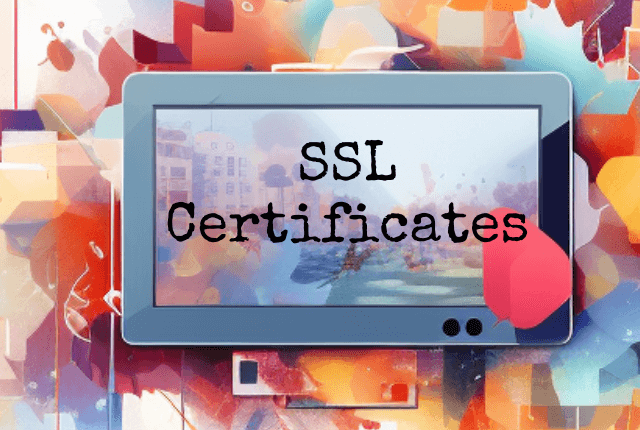SSL Certificates
Ensuring the security of online interactions is more crucial than ever before. At the heart of this security lies the Secure Socket Layer (SSL) certificate, a pivotal technology that safeguards data exchanged between your server and a browser. Imagine SSL as an unbreakable code—only the server has the key to decrypt this code, making it virtually impossible for cyber intruders to intercept or decipher the information being transmitted.
Why is an SSL Certificate a Must-Have for Your Website?
The significance of SSL certificates transcends mere data encryption. They are the backbone of internet security, serving a dual purpose: encrypting data and verifying the website’s identity. This dual functionality builds a trust bridge between your website and its visitors, a critical factor in the digital trust economy.
Understanding the Varieties of SSL Certificates
Extended Validation SSL Certificates (EV): The gold standard, offering the highest level of validation and trust indicators, such as the green address bar in browsers.
Certificate Authority SSL Certificates (CA): These certificates are issued by trusted certificate authorities and play a pivotal role in managing and issuing SSL certificates.
Organization Validation SSL Certificates (OV): A step above Domain Validation, OV certificates include thorough validation of the business, including its legitimacy and operational status.
Domain Validation SSL Certificates (DV): The quickest and most affordable option, suitable for blogs and smaller websites where trust and authentication are less of a concern.

The SEO Advantage of SSL Certification
Search engines, with Google leading the charge, are on a mission to make the internet a safer place. A key strategy in this mission is the prioritization of SSL-secured websites in search results. Google has made it clear: having an SSL certificate is no longer optional if you aim to rank well. It’s an essential element of website optimization, influencing not just security perceptions but also search engine rankings.
The era where HTTPS was a nice-to-have feature is long gone. Today, browsers flag non-HTTPS sites as ‘Not Secure,’ directly impacting user trust and website credibility. Installing an SSL certificate on your website is not just a security measure; it’s a fundamental SEO strategy and a critical step in establishing trust with your visitors.
SSL certificates are more than just a security feature—they are a testament to your website’s credibility and commitment to user privacy. Whether you’re running a small blog or a large e-commerce platform, the right type of SSL certificate can fortify your website’s security, boost its search engine visibility, and enhance user trust. Don’t wait until it’s too late; secure your site with an SSL certificate today and mark your footprint in the secure digital world.
SSL certificates play a major role in securing online communications, but when it comes to obtaining one, the questions of cost arise. The financial aspect of SSL certificates varies widely, depending on the level of security and validation needed for your website.
Cost of SSL Certificates
Free SSL Certificates: There are reputable sources of free SSL certificates, such as Let’s Encrypt and Cloudflare, which offer basic Domain Validation (DV) certificates at no cost. These are perfect for personal blogs, small websites, and projects where budget constraints are a consideration. Free SSL certificates typically have a shorter validity period (e.g., 90 days) but can be renewed indefinitely.
Paid SSL Certificates: For businesses and e-commerce sites requiring a higher level of security and trust, paid SSL certificates are advisable. These include Organization Validation (OV) and Extended Validation (EV) certificates. Prices can range from as little as $50 to over $200 per year for OV certificates, and EV certificates can cost anywhere from $70 to over $300 per year. The price differences reflect the depth of the validation process and the level of trust they confer on your site.
Factors Influencing the Cost
Type of Certificate: EV and OV certificates are priced higher due to the rigorous validation processes they require. DV certificates are less expensive or even free.
Provider: Costs vary by certificate authority (CA). Shopping around and comparing offers is advisable to find the best deal.
Additional Features: Some SSL certificates come with added benefits, like a warranty against data breaches on secured connections and site seals, which can influence their price.
Validity Period: The cost may also depend on the validity period of the certificate. Longer periods may offer a discount over annual renewals.

Why Consider Paid SSL Certificates?
While free SSL certificates provide a basic level of security, paid certificates offer additional benefits:
Higher Trust Indicators: Especially with EV certificates, where the address bar displays your company name in green, reassuring visitors of your site’s authenticity.
Warranty: Paid certificates often come with a warranty that protects the end user in case of a security breach due to a certificate flaw.
Customer Support: Access to dedicated support can be crucial in resolving any issues that arise during certificate setup or its lifecycle.
Obtaining an SSL certificate involves selecting a provider, also known as a Certificate Authority (CA), which issues these certificates after verifying your domain ownership and, depending on the certificate type, additional organization information. Here’s how you can go about getting one:
Free SSL Certificate Providers
Let’s Encrypt: A widely recognized non-profit CA that provides free Domain Validation (DV) SSL certificates. It’s supported by major web hosting providers, many of which offer automated tools to install and renew Let’s Encrypt certificates.
Cloudflare: Offers free SSL as part of its services to improve website security and performance. Cloudflare’s setup is straightforward, usually requiring a change in your domain’s DNS settings.
Paid SSL Certificate Providers
DigiCert: Known for a wide range of SSL certificate options, including EV and OV certificates, DigiCert is a trusted name in the industry, offering extensive support and warranty options.
Comodo SSL: Offers a variety of SSL certificates, including DV, OV, and EV options, at competitive prices. Comodo SSL certificates are recognized for their strong security features.
GlobalSign: Another reputable CA providing a range of SSL certificates, including options for organizations and extended validation certificates. GlobalSign is known for its scalability and enterprise solutions.
GoDaddy: While primarily known as a domain registrar and web hosting provider, GoDaddy also offers SSL certificates. They provide easy integration with domains hosted on their service, making it a convenient option for GoDaddy customers.
How to Obtain an SSL Certificate
Choose the Right Type of Certificate: Decide whether you need a DV, OV, or EV certificate based on your website’s needs and the level of trust you want to establish with your users.
Select a Certificate Authority: Based on your budget and the type of certificate you need, choose a CA. Consider factors like reputation, support, and additional features.
Generate a Certificate Signing Request (CSR): You’ll need to create a CSR on your web server, which includes details about your website and organization. This process varies depending on your server software.
Submit the CSR to the CA: Once you have your CSR, you’ll need to submit it to your chosen CA. You’ll also need to provide any required documentation, especially for OV and EV certificates.
Verification: The CA will then verify your domain ownership (and organization information, if applicable). This process can take from a few minutes to several days, depending on the certificate type.
Installation: After verification, the CA will issue your SSL certificate, which you’ll need to install on your web server. Many web hosting providers offer tools or services to simplify this step.
Choosing between a free and paid SSL certificate comes down to your website’s needs, your budget, and the level of trust you wish to establish with your visitors. For small projects and personal sites, a free SSL certificate may suffice. However, for businesses, especially those handling sensitive customer data, investing in a paid SSL certificate is advisable to maximize trust and security. Remember, the cost of an SSL certificate is minor compared to the potential cost of a data breach or lost trust from your visitors.






